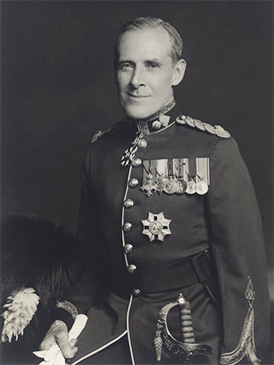Eric Norman Spencer Crankshaw facts for kids
Quick facts for kids
Sir Eric Norman Spencer Crankshaw
|
|
|---|---|
 |
|
| Birth name | Eric Norman Spencer Crankshaw |
| Nickname(s) | "Crankie" |
| Born | 1 July 1885 Over Peover, Cheshire, England |
| Died | 24 June 1966 (aged 80) Reading, Berkshire, England |
| Allegiance | |
| Service/ |
|
| Years of service |
|
| Unit | Royal Fusiliers |
Sir Eric Norman Spencer Crankshaw (born July 1, 1885 – died June 24, 1966) was an English cricket player, a military officer, and a civil servant. He was known for working closely with Winston Churchill during both World War I and World War II.
Contents
Early Life and Education
Eric Norman Spencer Crankshaw was born on July 1, 1885, in Over Peover, Cheshire, England. His parents were Richard Louis Crankshaw and Emily Spencer. He had a brother, Richard, and a sister, Madeline. His family also had a home in Dunlewey in County Donegal, Ireland.
When he was young, Crankshaw went to Eton College, a famous school in England.
Cricket Career
In 1903, Crankshaw became famous in the cricket world. Playing for Eton, he scored a century (100 runs or more) against Harrow at Lord's, a well-known cricket ground. Eton won that game easily.
Later, Crankshaw played for Gloucestershire County Cricket Club. He was a right-handed batsman. He played one important match for them in 1909 against Surrey.
Military Service
In 1906, Crankshaw joined the Royal Fusiliers in South Africa. He had already become an officer in a local army group called The Liverpool Militia in 1905.
During World War I, in 1915, Crankshaw was wounded at Ypres after arriving from India. He lost his left arm in this battle. He then spent six months recovering from lung problems. After getting better, he joined the Royal Corps of Signals, which handles military communications. He later became a senior officer for a large army group called the IV Corps.
After World War I ended, Crankshaw was in charge of finding places for 300 members of the Supreme War Council to stay in Versailles, France. After these important meetings, he became the Private Secretary (a personal assistant) to Winston Churchill. At that time, Churchill was the Secretary of State for War, a top government job. When Churchill left that role, Crankshaw also retired from the military.
However, during World War II, Crankshaw's skills were needed again. He was put in charge of the New Public Offices Fortress. This important place included Churchill's War Rooms, which were secret underground offices where Churchill and his team worked during the war.
Civil Service Role
In 1929, Winston Churchill, who was then the Chancellor of the Exchequer (in charge of the country's money), chose Crankshaw for a new job. Crankshaw became the Secretary of the Government Hospitality Fund.
In this role, Crankshaw was the main host for the British government. His job was to welcome important visitors from other countries and help build good relationships. He also looked after the Government Wine Cellar at Lancaster House. Crankshaw organized many events, like dinners, receptions, and visits to interesting places for these guests. He also helped with the arrangements for the Coronation of King George VI in 1937. He continued in this important job until he retired in 1949.
Family Life
On October 5, 1912, Eric Crankshaw married Winifred Mary Ireland in London. Winifred was from Mauritius and London. They met when Crankshaw was serving in Mauritius. They had two children:
- Lella Margaret Crankshaw (1916–2002)
- Major John Anthony Norman Crankshaw (1918–2000)
Crankshaw's granddaughter, Jasmina Hilton, became an actress. She had a role in the horror film The Vault of Horror.
Awards and Recognition
Sir Eric Crankshaw received several important awards for his service:
- 1919 - Member of the Order of the British Empire (MBE), Military Division
- 1934 - Companion of the Order of St Michael and St George (CMG)
- 1939 - Knight Commander of the Order of St Michael and St George (KCMG)
Later Years and Death
Sir Eric Norman Spencer Crankshaw passed away on June 24, 1966, at the age of 80. He died at the Royal Berkshire Hospital.

